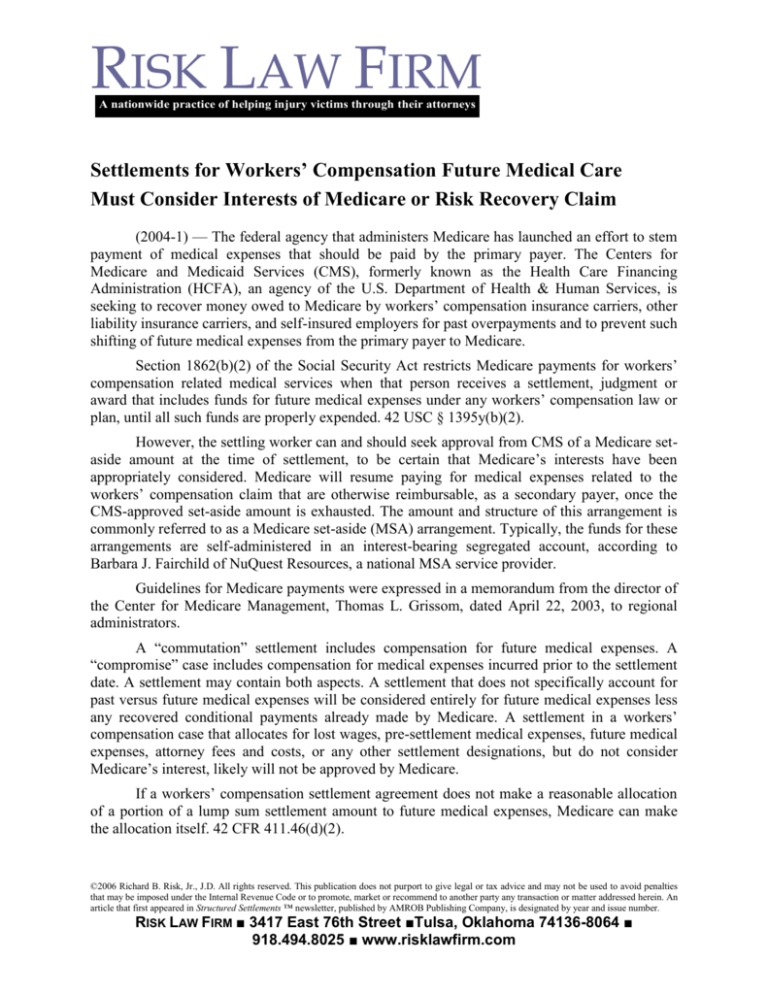
RISK LAW FIRM
A nationwide practice of helping injury victims through their attorneys
Settlements for Workers’ Compensation Future Medical Care
Must Consider Interests of Medicare or Risk Recovery Claim
(2004-1) — The federal agency that administers Medicare has launched an effort to stem
payment of medical expenses that should be paid by the primary payer. The Centers for
Medicare and Medicaid Services (CMS), formerly known as the Health Care Financing
Administration (HCFA), an agency of the U.S. Department of Health & Human Services, is
seeking to recover money owed to Medicare by workers’ compensation insurance carriers, other
liability insurance carriers, and self-insured employers for past overpayments and to prevent such
shifting of future medical expenses from the primary payer to Medicare.
Section 1862(b)(2) of the Social Security Act restricts Medicare payments for workers’
compensation related medical services when that person receives a settlement, judgment or
award that includes funds for future medical expenses under any workers’ compensation law or
plan, until all such funds are properly expended. 42 USC § 1395y(b)(2).
However, the settling worker can and should seek approval from CMS of a Medicare setaside amount at the time of settlement, to be certain that Medicare’s interests have been
appropriately considered. Medicare will resume paying for medical expenses related to the
workers’ compensation claim that are otherwise reimbursable, as a secondary payer, once the
CMS-approved set-aside amount is exhausted. The amount and structure of this arrangement is
commonly referred to as a Medicare set-aside (MSA) arrangement. Typically, the funds for these
arrangements are self-administered in an interest-bearing segregated account, according to
Barbara J. Fairchild of NuQuest Resources, a national MSA service provider.
Guidelines for Medicare payments were expressed in a memorandum from the director of
the Center for Medicare Management, Thomas L. Grissom, dated April 22, 2003, to regional
administrators.
A “commutation” settlement includes compensation for future medical expenses. A
“compromise” case includes compensation for medical expenses incurred prior to the settlement
date. A settlement may contain both aspects. A settlement that does not specifically account for
past versus future medical expenses will be considered entirely for future medical expenses less
any recovered conditional payments already made by Medicare. A settlement in a workers’
compensation case that allocates for lost wages, pre-settlement medical expenses, future medical
expenses, attorney fees and costs, or any other settlement designations, but do not consider
Medicare’s interest, likely will not be approved by Medicare.
If a workers’ compensation settlement agreement does not make a reasonable allocation
of a portion of a lump sum settlement amount to future medical expenses, Medicare can make
the allocation itself. 42 CFR 411.46(d)(2).
©2006 Richard B. Risk, Jr., J.D. All rights reserved. This publication does not purport to give legal or tax advice and may not be used to avoid penalties
that may be imposed under the Internal Revenue Code or to promote, market or recommend to another party any transaction or matter addressed herein. An
article that first appeared in Structured Settlements ™ newsletter, published by AMROB Publishing Company, is designated by year and issue number.
RISK LAW FIRM ■ 3417 East 76th Street ■Tulsa, Oklahoma 74136-8064 ■
918.494.8025 ■ www.risklawfirm.com
RISK LAW FIRM
Page 2
Medicare’s interests must reasonably be considered in a settlement. If, for example, the
facts show that a particular work-related condition requires continued treatment, and the settling
parties attempt to maximize the amount of disability or lost wages by releasing the primary payer
from liability for medical expenses, Medicare likely will not honor the allocation. Medicare may
also assert a recovery claim in such circumstance, if appropriate.
The CMS memorandum states that Medicare generally will honor judicial decisions
issued after a hearing on the merits of a workers’ compensation case by a state court of
competent jurisdiction. If a court or other authorized adjudicator of the case’s merits specifically
designates funds to a portion of a settlement that is not related to medical services, such as lost
wages, Medicare will accept that designation. However, CMS makes a distinction between a true
hearing on the merits, where Medicare’s interests are considered, and mere approval by the
adjudicator of settlement terms reached between the parties without evidence that the merits
were considered by the adjudicator. Setting claimants should consult professional advisors.
Fees, costs and expenses for the administration of the Medicare set-aside arrangement
and attorney costs specifically associated with establishing the arrangement may be recovered if:
(1) they are related to the Medicare set-aside itself; (2) they are reasonable in amount; and (3)
they are included in the proposed Medicare set-aside arrangement submitted to CMS and
incorporated in it. Fees, costs and expenses associated with the disability or lost wages portion of
the settlement and any portion that provides for non-covered medical services cannot be charged
to the Medicare set-aside arrangement. The CMS guidelines do not address attorney fees and
costs in connection with procurement of the settlement with the insurance carrier.
The set-aside amount is determined on an individual case basis. Medicare will consider
accepting a “life care plan” or similar evaluation prepared by a non-treating physician, if the
preparer: (1) examines the claimant; (2) reviews the claimant’s medical records; (3) contacts
treating physicians, if applicable; (4) is available to respond to questions from CMS; (5) prepares
a written summary report; and (6) offers a written medical opinion as to all reasonably
anticipated future medical needs related to the claimant’s work injury.
A beneficiary may self-administer her own Medicare set-aside arrangement if permitted
under state law, but will be subject to the same rules and requirements as an arrangement not
self-administered. All Medicare set-aside arrangements are monitored by private contractors to
Medicare.
Structured set-aside arrangements must also consider Medicare’s interests. When future
payments promised for future claim-related medical expenses under terms of the settlement are
funded by an annuity, Medicare determines the annuity’s value to be applied against the set-aside
amount not on the cost or “present day value” but instead on how much the annuity is expected
to pay over the life of the settlement. It is immaterial to Medicare if the annuity’s cost is less than
the set-aside amount as long as the sum of payments will exceed it.
If a beneficiary or injured individual dies before the Medicare set-aside arrangement is
completely exhausted, any amount left over in the arrangement may be disbursed pursuant to
state law, once Medicare’s interests have been protected. This may involve holding the
arrangement open for some period after the date of death, as providers, physicians and other
©2006 Richard B. Risk, Jr., J.D. All rights reserved. This publication does not purport to give legal or tax advice and may not be used to avoid penalties
that may be imposed under the Internal Revenue Code or to promote, market or recommend to another party any transaction or matter addressed herein. An
article that first appeared in Structured Settlements ™ newsletter, published by AMROB Publishing Company, is designated by year and issue number.
RISK LAW FIRM ■ 3417 East 76th Street ■Tulsa, Oklahoma 74136-8064 ■
918.494.8025 ■ www.risklawfirm.com
RISK LAW FIRM
Page 3
suppliers are permitted from 15 to 27 months after the date of service to submit their initial bill to
Medicare.
It is unnecessary to establish a Medicare set-aside arrangement if: (1) the facts of the
case demonstrate that the compensation from the settlement is only for services furnished prior to
the settlement; (2) there is no evidence that the individual is attempting to maximize other
aspects, such as lost wages and disability indemnification, to Medicare’s detriment; and (3)
treating physicians provide written conclusions, to a reasonable degree of medical certainty, that
the individual will no longer require any claim-related treatment covered by Medicare. ■
©2006 Richard B. Risk, Jr., J.D. All rights reserved. This publication does not purport to give legal or tax advice and may not be used to avoid penalties
that may be imposed under the Internal Revenue Code or to promote, market or recommend to another party any transaction or matter addressed herein. An
article that first appeared in Structured Settlements ™ newsletter, published by AMROB Publishing Company, is designated by year and issue number.
RISK LAW FIRM ■ 3417 East 76th Street ■Tulsa, Oklahoma 74136-8064 ■
918.494.8025 ■ www.risklawfirm.com







